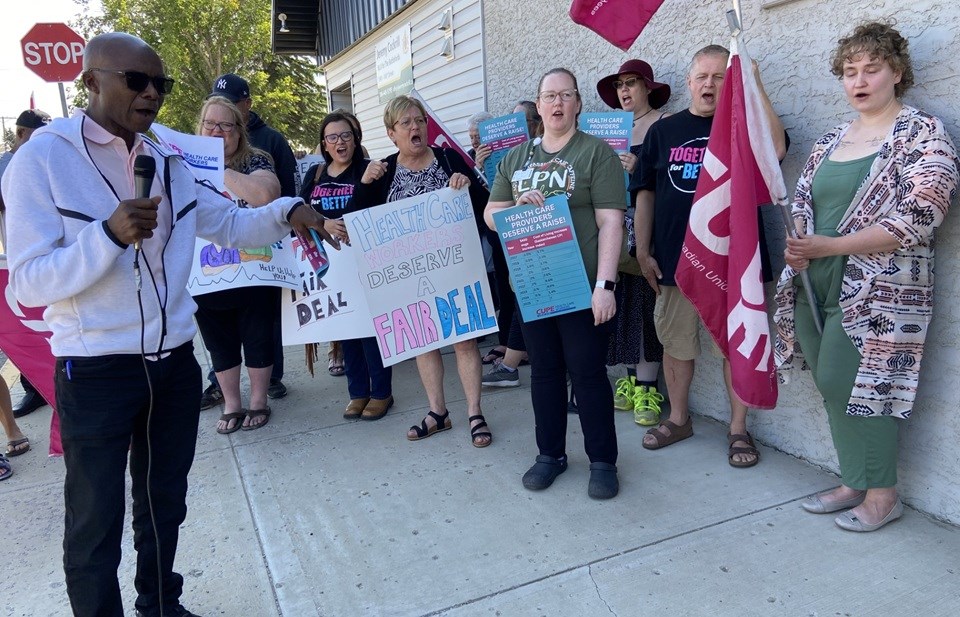NORTH BATTLEFORD — Carrying signs that read “Respect us, retain us, pay us,” and “Time for a fair deal,” health-care workers with CUPE 5430 took to the streets outside Saskatchewan Health Minister Jeremy Cockrill’s office in North Battleford on Wednesday to express concerns about low wages.
CUPE president Bashir Jalloh said after more than three years without a raise, health-care workers are asking the province to recognize their contributions and provide fair wages.
The local union represents about 14,000 members serving in health-care services across the province.
“If you look at our wages in the past, since 2017, our wage has only gone up by five per cent,” Jalloh said. “During that same time-frame we know the cost of living has gone up by 20 per cent. You do the math, if your wage [increase] is five per cent and then the cost of living is 20 per cent, that is not something that is sustainable. We cannot continue with the current trajectory.”
He said health-care workers are asking for an intervention, for the province to come to the table “with a fair wage, so we can have a collective agreement that will keep health-care workers in the province.”
Cindy Landrie, a licensed practical nurse at Battlefords Union Hospital, was among those who spoke at the press conference.
“We have not had a raise since 2022, while the cost of living has climbed every single year,” she said. “Remember, health-care workers were called heroes? Now we’re treated as disposable... The expectations placed on us are simply unrealistic.”
She added that wages are also not realistic.
“I have co-workers who are using the food bank to feed their families, because their paycheques aren’t [enough],” she said.
Another health-care worker, Brittany Rae, a continuing care aide in long-term care who lives and works in the riding, said she is here to “fight for respect for health-care workers and what they deserve.”
“The truth is our wages are not keeping up with inflation,” she said. “Groceries cost more, gas costs more, rent costs more. And yet our paycheques are falling behind.”
Rae said that is causing workers to leave.
“When workers leave, services crumble,” she said. “The staffing shortages that we are facing today are some of the worst we have seen.”
Jalloh said something needs to be done.
“We have to bargain a collective agreement to move forward with the goal of retaining people in this province, with the goal of providing services to the people of this province,” he said.
In response to the concerns, Cockrill issued a statement to SaskToday.
“Our government is focused on building a strong, sustainable health system that delivers the best care for Saskatchewan people,” he said.
“Health-care workers are the backbone of that system. We value their dedication and the compassion they show to patients and families every single day. That’s why earlier this year, SAHO [Saskatchewan Association of Health Organizations] put forward an unprecedented interim wage adjustment of three per cent, retroactive to April 2023. For many full-time employees, that meant immediate support while long-term negotiations continue. While CUPE, SEIU-West, and SGEU chose not to accept that offer, we remain hopeful.”
Cockrill noted the province is confident SAHO and the unions will reach agreements that are “fair to employees, responsible to taxpayers, and most importantly support the delivery of high-quality care for Saskatchewan patients.”
“At the end of the day, we all share the same goal: supporting health-care workers and ensuring people in our province get the care they need,” he said.




